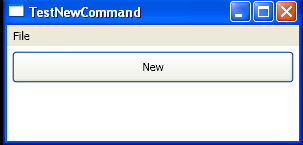Use CommandBinding to bind ApplicationCommands.New in code

<Window x:Class="Commands.TestNewCommand"
xmlns="http://schemas.microsoft.com/winfx/2006/xaml/presentation"
xmlns:x="http://schemas.microsoft.com/winfx/2006/xaml"
Title="TestNewCommand" Height="150" Width="300">
<Window.CommandBindings>
<CommandBinding Command="ApplicationCommands.New"
Executed="NewCommand" />
</Window.CommandBindings>
<StackPanel >
<Menu>
<MenuItem Header="File">
<MenuItem Command="New"></MenuItem>
</MenuItem>
</Menu>
<Button Margin="5" Padding="5" Command="ApplicationCommands.New" ToolTip="{x:Static ApplicationCommands.New}">New</Button>
<Button Margin="5" Padding="5" Visibility="Hidden" Command="ApplicationCommands.Open">Open (unwired)</Button>
<Button Margin="5" Padding="5" Visibility="Hidden" Click="cmdDoCommand_Click" >DoCommand</Button>
</StackPanel>
</Window>
//File:Window.xaml.cs
using System;
using System.Collections.Generic;
using System.Text;
using System.Windows;
using System.Windows.Controls;
using System.Windows.Data;
using System.Windows.Documents;
using System.Windows.Input;
using System.Windows.Media;
using System.Windows.Media.Imaging;
using System.Windows.Shapes;
namespace Commands
{
public partial class TestNewCommand : System.Windows.Window
{
public TestNewCommand()
{
InitializeComponent();
CommandBinding bindingNew = new CommandBinding(ApplicationCommands.New);
bindingNew.Executed += NewCommand;
this.CommandBindings.Add(bindingNew);
}
private void NewCommand(object sender, ExecutedRoutedEventArgs e)
{
MessageBox.Show("New command triggered by " + e.Source.ToString());
}
private void cmdDoCommand_Click(object sender, RoutedEventArgs e)
{
Console.WriteLine("command");
}
}
}
Related examples in the same category